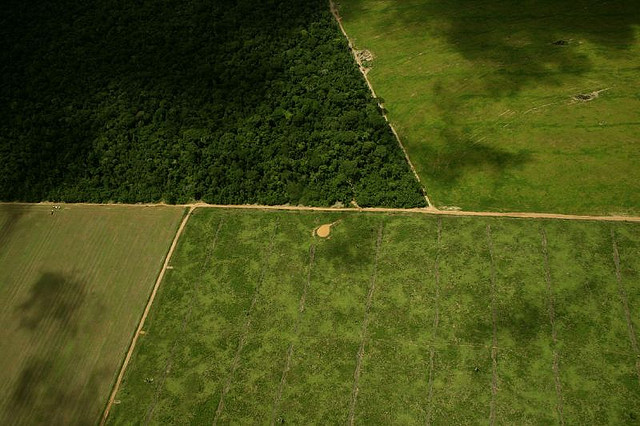Putting a Halt to Tropical Forest Loss is a Matter of Human Survival
(Vienna, 9 September 2019) Never before, it seems, have forests received as much public attention as at present. Sadly, the reasons for this are most distressing: forest fires of unprecedented dimensions all over the globe; a growing lack of resistance of trees to stressors such as drought, pests and diseases; and the uncontrolled exploitation of forests in environmentally sensitive areas.

In this context, it is crucial to emphasize the particular importance of tropical forests for global well-being and, consequently, the urgency to effectively curb deforestation and forest degradation.
“Tropical forests are a globally significant resource for a number of reasons – their role in carbon storage, their biodiversity value, their role in sustaining local livelihoods, and their role in regulating the atmospheric hydrological cycle”, emphasizes the representative of Latin America and the Caribbean on the Board of the International Union of Forest Research Organizations (IUFRO), Dr. Manuel Guariguata of CIFOR, Peru.
“A growing body of evidence accumulated over the last few years strongly indicates that tropical deforestation disrupts the movement of water in the atmosphere, causing major alterations in rainfall over vast distances potentially leading to drought in key agricultural areas worldwide. This has tremendous implications for the world’s food security. That is, the forests cause the rainfall, not the other way around”, he explained.
The drivers of deforestation are multiple and they interact in many ways: Poverty; poor legal enforcement; unclear and/or overlapping land use designations by uncoordinated government agencies; agroindustrial expansion by influential elites; price hikes of international commodities such as cocoa or coffee; and poor government capacity to enforce land use change legislation in agricultural frontiers. Deforestation driven by commercial agriculture and cattle rearing is a persistent problem across tropical countries, as are uncontrolled mining of precious minerals and illegal logging activities.
Yet, there are many possible solutions and tools to tackle the problem of deforestation and to help make forests more resilient to climate change. Some of the solutions, according to Dr. Guariguata, are:
Securing access and tenure rights to Indigenous communities.
There is scientific evidence across Amazon basin countries, for example, that supports the contention that management by indigenous communities helps to curb deforestation, reduce forest carbon emissions, and conserve biodiversity.
Encouraging the agro-industrialist private sector to adopt voluntary sustainability standards aiming at zero deforestation.
It is important to understand, among other things, that the implementation of private sector commitments to halt deforestation currently varies across products. For example, voluntary sustainability standards for palm oil are most advanced, followed by cocoa and soy. In contrast, standards for coffee and beef lag behind, despite the fact that cattle raising for beef is one of the main causes of tropical deforestation.
Improving the coherence and complementarity of forest conservation and sustainable use policies.
This applies not only to different government agencies with a forest mandate and across government levels, from the local to the national, but also to all stakeholders in the landscape such as local communities, agriculture and forestry enterprises, environmental NGOs and civil society at large. They have to talk with each other and work with each other in constructive ways to effectively curb deforestation, reconcile conflicting land uses and restore degraded land to build future more resilient and diverse landscapes
The widespread nature of the problems of deforestation, forest degradation and land-related conflicts, especially in tropical regions, and the equally widespread nature of their negative effects as they ripple outward across cultures and borders, will be addressed in many of the scientific sessions at the IUFRO World Congress in Curitiba, Brazil, on 29 September – 5 October 2019.
Related Congress outcomes will be disseminated broadly to stakeholders and the international media. In this way, IUFRO seeks to make a substantial contribution to raising public awareness regarding these and other important issues. IUFRO, as a strictly scientific, independent, non-profit, non-governmental and non-discriminatory organization, offers platforms such as itsWorld Congress in Brazil for in-depth scientific discussion and interdisciplinary research to provide the material for evidence-based decisions.
Professor Mike Wingfield, President of IUFRO, makes the point that “Evidence shows that IUFRO can achieve the greatest positive impact on management and policy decisions affecting forests and people by addressing critical problems where they occur. This is especially true in collaboration with the scientists and research institutions in affected countries and regions, and then broadly communicating their findings. It is my sincere hope that the members of the global IUFRO scientific community and our stakeholders share this view. Importantly that we will be able to use the Congress as a platform for open discussions on critical issues, for sharing knowledge and for offering advice based on sound scientific evidence.“
25th IUFRO World Congress:
http://iufro2019.com/
Media contact:
Gerda Wolfrum, International Union of Forest Research Organizations (IUFRO), wolfrum@iufro.org
###########
The International Union of Forest Research Organizations (IUFRO) is the only worldwide organization devoted to forest research and related sciences. Its members are research institutions, universities, and individual scientists as well as decision-making authorities and other stakeholders with a focus on forests and trees.

Leave a Reply